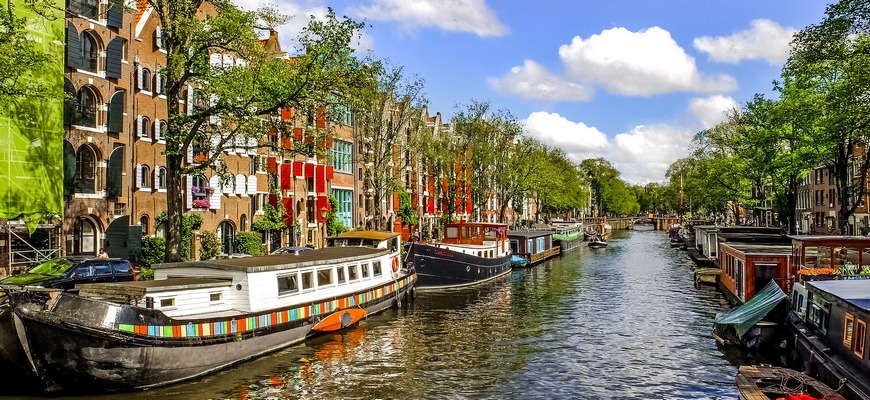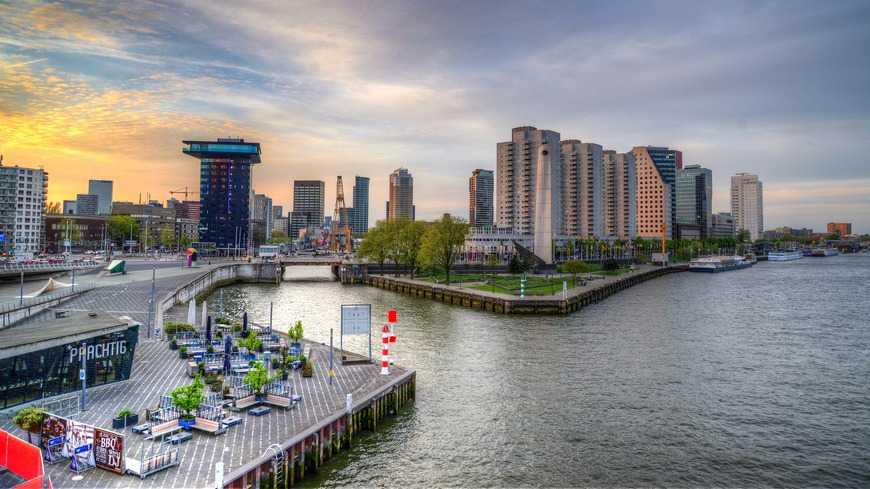
version


As of June 2020, the unemployment rate in the Netherlands was 4.3%. Last month the rate has increased slightly due to the coronavirus pandemic, but it is still significantly lower than the average European rate. Economic activity is stable at the level of 70.2%. 222,000 vacancies have been posted on local job sites in the first quarter of 2020.
According to official statistics, more than 20% of the population are foreigners. Almost 70% of the population is employed in the service sector, and 25% in the industrial sector.
The Netherlands is constantly featured in various ratings. For example, Amsterdam is in the top-15 cities for freelancers. The country is in the top-10 countries with the fastest Internet. The Netherlands ranked 4th in terms of economic competitiveness and eighth in terms of "purity" in relation to corruption.
The country is not far behind in terms of quality of life as well: three Dutch cities are in the top-10. Amsterdam is one of the greenest cities in the world. The Netherlands is also in the top-5 countries for the life and development of children and in terms of happiness.
Conditions for obtaining a residence permit are standard for Europe. A residence permit can be obtained by:
The residence permit is valid for a year and can be renewed. The registration period is about 3 months. After 5 years of legal residence you can apply for citizenship, which requires you to pass a social integration test, have no problems with the law and have an income of at least €1,500 per month.
The first step is to go to the official website of the employment service of the Netherlands, where you will find a database with vacancies and also a lot of articles about employment and the specifics of working in the country. Other major sites (in English/Dutch):
Local papers:
Internships:
You do not have to speak Dutch, but advanced English at is necessary. However, there are some specialties that require Dutch (salesmen, waiters, doctors, ten IT-specialist in a private enterprise focused on foreigners, English may be enough.
A migrant should not have serious health problems or a criminal past. Work experience in the specialty is very desirable, and education corresponding to the position you are applying for is also a huge advantage.
Documents must be confirmed, translated into English/Dutch/German/French and notarized. Diploma recognition issues are handled by Nuffic Neso and Informatie Beheer.
The local employers often sign a contract for 6-12 months. After 3 temporary contracts, the employer must decide whether to end the relationship with you or offer a permanent contract. It is the latter that is the main goal of most expats, since only with this document they can get a mortgage approval and a guarantee that they will not be fired at any time.

Official employment requires you to:
1. Job interview. About 90% of the population of the Netherlands speak English, so don’t be afraid that communication with a potential employer will necessarily take place in the national language. Local employers are very picky, so try to demonstrate the maximum of your knowledge and skills.
2. Nostrification of the diploma. The longest and most expensive stage in the entire process, which will take about a year and cost €4,000-5,000. But there is a significant advantage: this procedure must be done once, and if you want to change your job and move to another EU country, the US or Canada, you will not need to re-legalize it. You can check the status of the diploma and its compliance with the Dutch requirements here.
3. The working visa. Must be issued in your country of residence through the Dutch Consulate or VFS Global visa centers. The list of documents is pretty standard: a passport, two photos, an insurance (with the coverage amount of at least €30,000), a completed application form, education documents, proofs of financial solvency. In addition to the standard package you will need a contract with the employer to indicate the salary and other working conditions, as well as a work permit.
To extend a work visa you need to contact the Migration Department of the local police department and write a corresponding application. The reason is the extension of the contract with the previous employer or the signing of a new employment contract. The procedure takes about 10 days and requires €380 as an administrative fee.
4. A work permit. The execution of this document is entirely the responsibility of the employer. The basis is an employment contract certified by the Ministry of labour of the Netherlands. This approval is only possible, if there have been no local or non-EU candidates for the position for at least 6 weeks.
The employer submits a certificate of registration of the enterprise, a publication about the vacancy, confirmation that he really looked for candidates among the local ones, as well as the reasons for their refusal to the Ministry of Labor. After certification of the contract, the employer submits a request to the Immigration Service. The review period is up to 3 months.
There are three types of work permits.
Several categories of applicants do not need to obtain a labour permit or work visa:
5. The residence permit. Citizens of non-European countries need to obtain a residence permit (VVR – verblijfsvergunning). Usually, this issue is handled by the employer after you get a work permit. The Dutch immigration service (IND) considers the application for up to 90 days.
After arriving in the country within 2 weeks, you need to make an appointment with IND to collect your VVR card. The validity period is the same as for a visa. After obtaining a residence permit you must register with the local municipality (gemeente), get a BSN number and get medical insurance.
An employee who does not have a work permit and a work visa will face imprisonment and deportation from the country with a ban on re-entry from 1 year to 20 years. The employer receives a fine of €4,000-8,000. If they repeat the violation in the next 2 years, the fine is doubled. A company that has committed such violations repeatedly has its license revoked.
By the way, the Netherlands is in the top ten best countries in Europe for pensioners. If you have lived and/or worked in the country for at least 50 years before reaching retirement age, you are entitled to a full pension. If at least once officially worked in the Netherlands, then a partial allowance is provided.
The amount of payments directly depends on the marital status: single people, who are entitled to a full pension, receive 70% of the minimum wage, family – 50%. Additional benefits, support amounts and vacation allowances are provided.
The Dutch labour market provides about 10,5 million jobs. Many local recruiters note a constant shortage of staff. There is a particularly severe shortage of specialists in the construction sector, and the least needed is additional specialists in public administration. There is also always a lack of “blue collars” in factories and agriculture.
A separate category is seasonal workers, who are provided with a work visa for up to 24 weeks. Paperwork in this case is easier and faster than for other categories of professionals. The main burden and collection of documents falls on the shoulders of the employer. But it is worth noting that in the context of this permission, you cannot change your employer.
All that you need is a valid foreign passport and consent to undergo a TBPE test on arrival. The employer must submit a work contract under which the employee is guaranteed a salary not lower than the minimum wage. The cost of obtaining a permit is also covered by the employer.
Also read:
The Best Countries to Settle in
Immigration via Education. Best Programs
New Opportunities for Digital Nomads After COVID-19
When looking at the Netherlands as a country to move to, you should assess your capabilities, skills and the conditions offered. The cost of living in Amsterdam is quite high, it takes about €1,700–2,000 per month for one person.
The minimum wage in the Netherlands (before taxes) is €1,654 per month at the moment, the average wage is €2,855. The minimum wage is paid mainly to low-skilled workers; for professionals with good experience and high qualifications the salary is at least twice as high. The average hourly rate for service workers is €8-10 per hour.
A separate category includes the rates of employees, who are not 21 years old yet. Their minimum salary is 30-80% of the minimum wage, depending on their age. For example, for 15 years it is €496, for 20 - €1,322.
The salary directly depends on the applicant's education. In the Netherlands, there is even a special document that describes what salaries a person can expect, depending on the existing specialty and educational institution.
Employers often refer to their net income after paying all taxes and contributions in a job ad. In addition, the Dutch rarely negotiate about the salary size and specify the final amount of remuneration.
Taxes are deducted by the employer, deducting the necessary amount from the employee's salary. Thus, a person receives a net income on their hands. 30% of income is not taxed for new foreign employees, highly qualified specialists and those who previously lived further than 150 km from Amsterdam. The rule is valid for the first 5 years.
But then there is a fairly impressive percentage.
But when calculating the tax, there are some nuances. The amount is divided into several parts and a different bid is applied to each of them. For example, if the income is higher than €68,507, then 51.95% is not applied to the entire amount, but only to the amount that exceeds this limit. In addition, you can count on tax benefits depending on the number and age of children, total family income, and so on. Usually, at the end of the year most employees receive a refund of part of the amount.
If a person is officially living in the Netherlands and loses the job, they are entitled to a benefit calculated on the basis of their last salary. In the first 2 months they are paid 75%, then 70%. The maximum payment period is 3 years, with daily deductions. A maximum of €150 per day.
A child benefit is also provided, regardless of the family income. Each child under 6 years of age receives €58 per month, 6-11 years - €70, 12-17 - €82.
.jpg)
Getting a job in the Netherlands is not an easy task. But the effort can be paid off with a good salary, if you are a highly sought or highly qualified specialist. If you are applying for a seasonal job, do not expect a huge income. But you do not have to bother with paperwork, and the employer often provides accommodation and food for free or at very reasonable prices. Given the need for specialists in different areas and the developing economy, it is always possible to find a job in the Netherlands.
Author: Victoria Zakirova
Photos: pixabay.com





